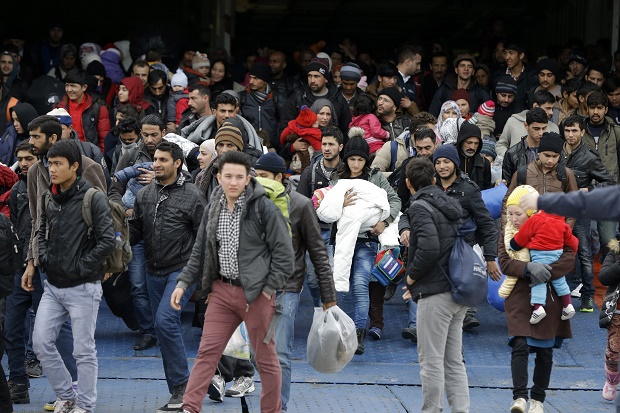Greek islanders march against migrant facility

Migrants arrive from the eastern Greek islands by ferry at the Athens’ port of Piraeus on Wednesday, Feb. 10, 2016. The International Organization for Migration announced that 409 people have died this year trying to cross the Mediterranean Sea, and migrant crossings in the first six weeks of 2016 are running at nearly 10 times the rate of the same period last year. AP Photo
KOS, Greece—Hundreds of people on the Greek island of Kos on Wednesday protested against plans to build a migrant facility there, voicing fears about its possible impact on tourism.
“No to the hotspot on our island,” read the banner leading the demonstration by traders and tourism business owners, referring to the migrant registration and short-stay facilities the European Union wants to be built there.
With Greece under increasing EU pressure to improve border controls, the island of 30,000 has taken a stand against hosting migrants, holding up the process.
READ: Migrants clash with Macedonian police on Greek border
Three locals were hurt last week in a scuffle with riot police near the area chosen to build the migrant centre, or hotspot, including a journalist covering the protest who was later detained.
Article continues after this advertisement“We are against the hotspot,” shouted conservative Kos Mayor Yiorgos Kyritsis, who accuses the government of “blackmailing” islanders, as the demonstrators gathered outside the town hall.
Article continues after this advertisementWhile the nearby islands of Lesbos, Leros, Samos and Chios have grudgingly accepted the challenge, Kos leaders have been opposed from the start, arguing that the long-term presence of migrants will undermine the tourism industry which is the island’s main source of income.
“In 2015 tourism fell five percent and there is a study showing a 30-percent fall in reservations this year,” Kos deputy mayor David Gerasklis told AFP at Wednesday’s demonstration.
Since last year, the five Aegean islands have become the principal gateway to Europe for over 800,000 people attempting the journey from neighbouring Turkey to escape war and poverty.
READ: At least 10 migrants dead as boat sinks off Greek island
Most of them are Syrians, followed by Iraqis, Afghans and other nationalities—of whom Kos has received a fraction with the majority heading to the larger Lesbos island.
The hotspots in Greece and Italy are meant to screen bona fide war refugees—which other EU states are prepared to accept—from economic migrants who are to be repatriated.
They are also designed to weed out potential extremists, such as the two Islamic State of Iraq and Syria jihadists who sneaked into Greece in October posing as Syrian refugees, and carried out deadly suicide attacks in Paris a month later.
Under European pressure to improve migrant controls at Greece’s maritime borders with Turkey, the leftist government of Prime Minister Alexis Tsipras has pledged to complete hotspots on Kos and the other four islands by mid-February.
Kos is among Greece’s top ten travel destinations with nearly 900,000 flight arrivals between January and September 2015.
A vocal minority?
Government officials say the protests are being motivated by a minority on the island backed by far-right hardliners.
“Most of the residents essentially have no objection,” Yiorgos Hartofilis, member of a local rights solidarity group, told Efimerida ton Syntakton daily.
“Since refugees will continue to arrive on Kos it is preferable to have a humane facility available,” he said.
“The hotspot will create jobs,” added Hayoul Michail of human rights group Mercy Corps, labelling the protests “negative publicity” for the island.
The Kos council this week decided to hold a referendum on the issue but the plan was shot down by the higher-placed regional council of the Dodecanese island group on Wednesday.
Visiting Turkey this week, German Chancellor Angela Merkel said Berlin and Ankara would ask NATO to help police the Turkish coast and stop migrant traffickers.